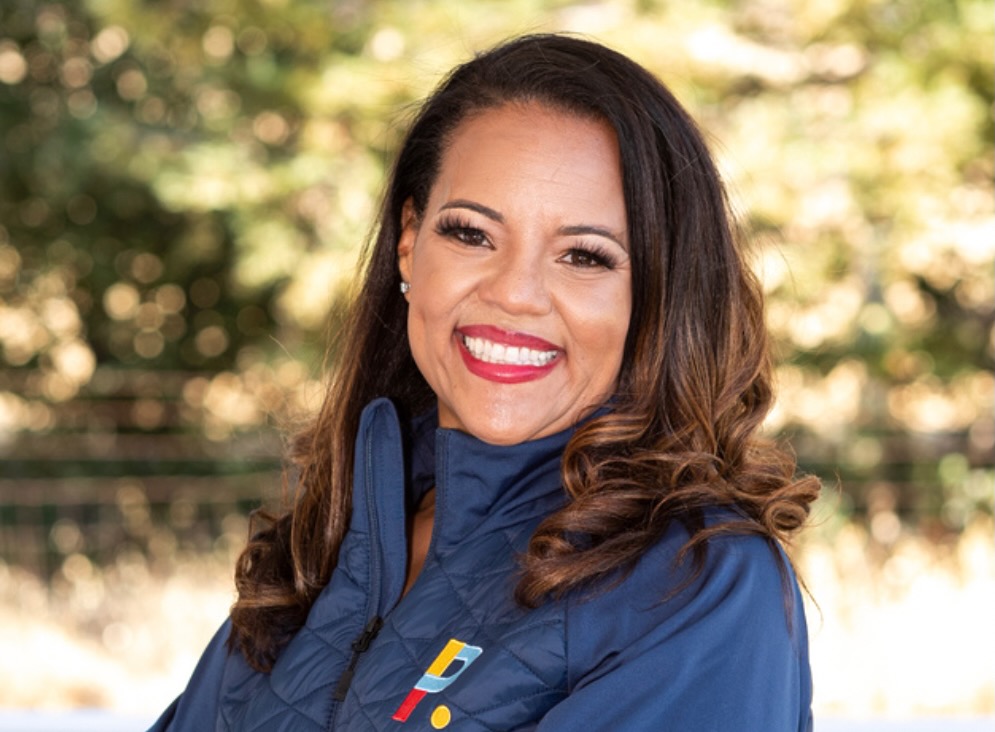Ask Phaedra Ellis-Lamkins about her work, and she’ll tell you she has the best job. As the CEO and cofounder of Promise, she works with governments and utilities to administer public services and benefits more efficiently. But her journey to the helm of a fast-growing, profitable tech company wasn’t a direct one. She’s been a kid in the free lunch line at school, a labor organizer, CEO of Green for All and an advisor to Prince.
In 2017, she started Promise, a tech company working to modernize how public services and utilities work with their most marginalized clients. Part of the Y Combinator accelerator program in 2018, today the company works with entities around the country, including Cal Water and the city of Richmond, to streamline the ways that people experiencing poverty can access utilities and government services — while making things easier and more efficient for those agencies.
Q: What’s the backstory on Promise?
A: I founded Promise because it was important to me that technology be used to improve the lives of working people. In a lot of cases, technology was being used for things that were fun or good, like getting a taxi outside the club or getting someone to walk your dog or park your car, but there weren’t a lot of technology companies I saw that were improving the lives of the people I grew up with.
I wanted to make sure we had a company that was growing at a venture scale — growing really quickly — that had a model that was not predatory; when the company did well, the people who I grew up with also did well. To do that, we serve mostly governments and some utilities, and we work to deliver social programs using technology to make them not just easy, but also to stop waste, fraud and abuse. We also do interest-free payment plans. If you can get a Peloton interest-free, you should be able to pay government debt interest-free. Everything we do is about making public institutions work well for the people who rely on them.
A former executive with the South Bay AFL-CIO Labor Council, Phaedra Ellis-Lamkins brings a unique perspective to her work as co-founder and CEO of Promise. (Courtesy Sasha Craig)
Q: You have a long history of leadership across different sectors, including labor, social services and now tech. Walk me through that journey and how it’s shaping what you’re doing now.
A: I started working in the labor movement in the South Bay, and I saw technology’s impact on working people. It seemed like it was great for some people who were becoming millionaires, but for most people in the valley, it was a catastrophic economic event. We saw people living in garages. Housing prices became really expensive, and people all of a sudden were driving to Tracy or Stockton to live.
Then I went and worked at a nonprofit focused on the environment and came to feel that tech was also not good for the environment. Then I worked in music, and thought (tech) was horrible, because it was devaluing the price of content.
I wanted to understand how to make tech work better, so I went to work at a tech company, and it transformed the way I thought about it. It’s not inherently wrong or broken. It’s that the tools were not always put toward finding solutions that were important to the people that I wanted to serve.
The best thing we can do as a company is to build technology that works and then to be a successful company. We purposely aren’t a nonprofit. We’re not a public benefit corporation. I’m not trying to win a grant. I want to win in the contest of capitalism. I want people to believe that you can actually not harm people and build a company.
Q: What inspired your focus on service?
Related Articles
This 26-year-old Silicon Valley tech worker uses her impostor syndrome as novel inspiration
A: I grew up without money. My mom was a waitress, and I was in a gifted program, so I got exposed to wealth in a way I probably would normally not have been. I’d never seen entitlement until I saw kids who believed the world should treat them in a certain way. As the only one on free lunch in the program, I’d have to stand in the free line, separate from the other kids paying for lunch. I’m incredibly lucky that I’ve been able to build my own personal wealth in such a way that people treat me differently now, and I want that for everyone. It’s unacceptable that we see janitors, housekeepers, landscapers and now teachers — people who are doing inherently good things for society — struggling to make ends meet.
Q: Walk me through how Promise works.
A: We have three different products. First, we offer utilities flexible repayment options for their customers. San Jose Water is a client. Say you get behind on your water bill — you lose your job or something happens. Through Promise, they can offer an interest-free payment plan so you can keep your service on. You can pay in many different ways.
We also work with states to help get money out. We use existing SNAP (federal food aid) or affordable housing data to find people who qualify. In this day and age, we shouldn’t need to ask people to fill out manual applications or upload documents when we can get all that information pretty easily. It’s a modern way to run public benefits.
The last product we offer is income verification, which comes from the recognition that in many places, people still have to upload their paychecks to verify their incomes for public programs. It doesn’t make sense in 2024 to be uploading your paycheck.
Q: How does this benefit your various stakeholders?
A: The people who rely on our services are grateful, I think, to be treated with respect. When someone is struggling to pay their bill and facing a water shutoff, and we can keep them on their service and let them pay back the debt on their terms, or we can tell them when they might qualify for aid and get them on a program, it’s pretty great.
For the agencies we work with, it’s actually a better financial option and is a great way to improve their customer service quality. For investors, our revenues grow year over year, and we’re profitable. In technology, it’s unusual for a software company to be profitable and growing at this pace.
Q: What are some examples of how your tech is being used in California?
A: In Southern California, we work with agencies to help people pay off criminal justice debt and parking ticket debt. In the Bay Area and in Northern California we work with water utilities. Our most consistent work in California is bringing money into agencies through flexible repayment terms. Our fundamental belief as a company is that people don’t want to not have water or power or go to jail. If you make it easy, people will pay.
Q: What’s next on the horizon for Promise?
A: We’re signing a new contract with a southern state to run a utility program for emergency assistance. We plan to make sure you don’t have to come into an office to apply. That’s what’s exciting to me: the evolution of public services and ensuring that government evolves. We expect that in the defense sector, right? I want that for social services.
Organization: Promise (promise-pay.com)
Position: Co-founder, CEO
Age: 48
Birthplace: San Francisco
Education: California State University, Northridge
5 Things to Know about Phaedra:
Currently training for an amateur fitness competition
Has a lot of farm animals at her property
Makes her own honey
Used to work with Prince
Is taking 20 kids to see Taylor Swift in New Orleans


